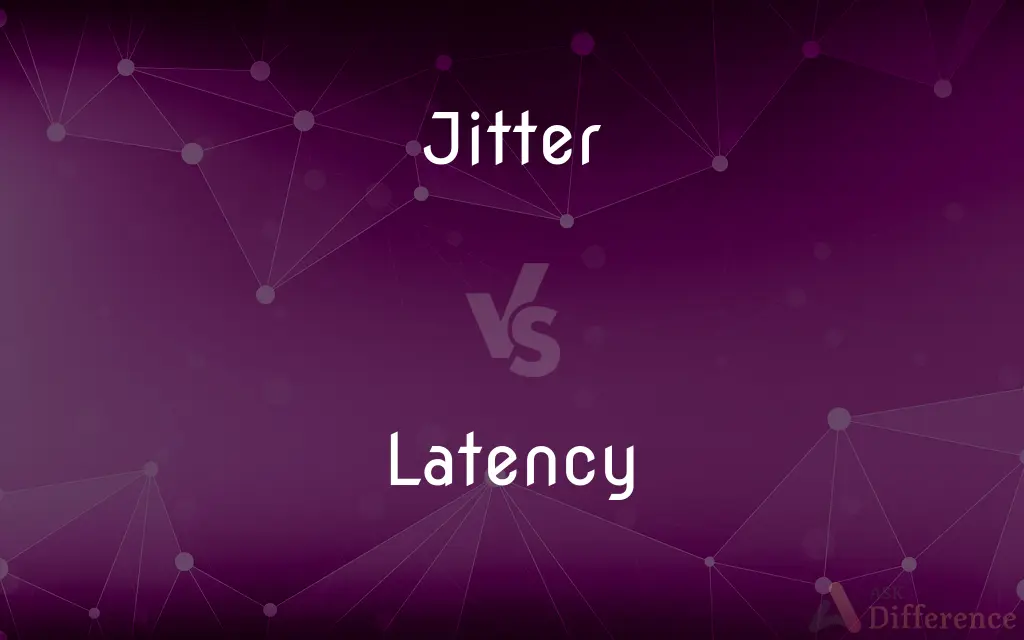Jitter vs. Latency — What's the Difference?
By Tayyaba Rehman & Urooj Arif — Published on January 30, 2024
Jitter refers to the variability in delay of data packets over a network, while latency is the time taken for a packet to travel from source to destination.

Difference Between Jitter and Latency
Table of Contents
ADVERTISEMENT
Key Differences
Jitter in networking is the variation in time delay between data packets arriving at a destination, causing inconsistencies in receiving data. It's particularly noticeable in real-time applications like VoIP or online gaming. Latency, on the other hand, is the total time it takes for a data packet to travel from the source to the destination. It represents the delay experienced in data transmission over a network.
Jitter arises due to network congestion, improper queuing, or configuration errors which cause packets to arrive at different intervals. This variation can disrupt the smoothness of data streaming or voice calls. In contrast, Latency is caused by the physical distance the data has to travel, network congestion, and the speed of the routers and switches it passes through. Latency affects the responsiveness of the network.
In terms of impact, Jitter can be detrimental in situations where timing is crucial, such as video conferences or online gaming, where consistent data flow is required for a smooth experience. Latency impacts the user experience in almost all online interactions, as it determines how fast the data reaches its destination.
To mitigate Jitter, networks often employ techniques like jitter buffers to smooth out the data flow. This involves temporarily storing data packets and releasing them at regular intervals to ensure a steady stream. To reduce Latency, optimizing the network's infrastructure, such as using faster connections or optimizing routes, is necessary.
The measurement of Jitter is usually in milliseconds and represents the variability in latency over time. Latency is also measured in milliseconds but represents the average time it takes for a packet to reach its destination.
ADVERTISEMENT
Comparison Chart
Definition
Variation in delay of data packets
Time taken for packets to travel from source to destination
Causes
Network congestion, configuration errors
Physical distance, network congestion, infrastructure
Impact
Disrupts real-time applications
Affects responsiveness and speed of network
Mitigation
Use of jitter buffers
Network optimization, faster connections
Measurement
In milliseconds, as variability
In milliseconds, as average delay
Compare with Definitions
Jitter
Jitter is the variability in time delay in network traffic.
High jitter caused uneven audio quality in the video call.
Latency
Latency is influenced by physical distance and network infrastructure.
Latency increased due to the long distance between servers.
Jitter
Jitter affects the smoothness of streaming and real-time applications.
Streaming video was choppy due to high network jitter.
Latency
Latency is the delay time in data transmission over a network.
The high latency affected the loading time of the website.
Jitter
Jitter can disrupt communication in time-sensitive applications.
The VoIP call had interruptions caused by jitter.
Latency
Latency affects the speed and responsiveness of network applications.
Video conferencing is impacted by network latency.
Jitter
Jitter represents the inconsistency in packet arrival times.
Online gamers often experience lag due to jitter in the network.
Latency
Reducing latency improves overall network performance.
Upgrading our routers significantly reduced the network's latency.
Jitter
Jitter is measured as the variation in latency over a network.
The network's jitter was high, indicating fluctuating delays.
Latency
A latent period.
Jitter
(telecommunications) An abrupt and unwanted variation of one or more signal characteristics.
Latency
The time interval between initiating a query, transmission, or process, and receiving or detecting the results, often given as an average value over a large number of events.
Jitter
(computing) A program or routine that performs jitting; a just-in-time compiler.
Latency
(electronics) A delay, an interval between the initiation of something and the occurrence.
Latency
(medicine) The delay between a stimulus and the response it triggers in an organism.
Latency
The time between a stimulus the appearance of the response; the time between any causal action and the first appearance of the effect. Called also latent period.
Latency
(computer science) the time it takes for a specific block of data on a data track to rotate around to the read/write head
Latency
Latency measures the time it takes for a packet to reach its destination.
Online gaming requires low latency for a responsive experience.
Common Curiosities
How can jitter be reduced?
Jitter can be reduced with jitter buffers and network optimization.
How does jitter affect online activities?
Jitter can cause disruptions in streaming, online gaming, and VoIP calls.
What causes jitter?
Jitter is caused by network congestion, configuration errors, and improper queuing.
What is network latency?
Network latency is the time it takes for data to travel from source to destination.
Can jitter be measured?
Yes, jitter is measured in milliseconds, indicating variability in delay.
How can Jitter be mitigated?
Quality of Service (QoS) mechanisms, buffer management, and prioritization of traffic can help reduce Jitter.
Is Jitter always undesirable?
In some cases, slight Jitter may not affect the performance of non-real-time applications, but it is generally undesirable for real-time communication.
How does Latency affect web browsing?
High Latency can result in slower webpage loading times and a less responsive browsing experience.
What is jitter in networking?
Jitter is the variation in time delay between data packets in a network.
Can Jitter be eliminated completely?
It's challenging to eliminate Jitter entirely, but it can be minimized to an acceptable level for specific applications.
Does Jitter affect online gaming?
Yes, Jitter can lead to lag and inconsistent gameplay experiences in online gaming.
Why is Latency critical for online gaming?
In online gaming, low Latency is crucial to reduce the delay between player actions and their effects in the game.
Can Latency be reduced in networks?
Yes, network optimization, using faster hardware, and minimizing the distance data must travel can help reduce Latency.
Is zero Latency achievable in data communication?
Achieving zero Latency is practically impossible due to physical limitations, but it can be minimized for better performance.
Share Your Discovery

Previous Comparison
Hard Real-Time System vs. Soft Real-Time System
Next Comparison
Tetrahedral vs. Trigonal PyramidAuthor Spotlight
Written by
Tayyaba RehmanTayyaba Rehman is a distinguished writer, currently serving as a primary contributor to askdifference.com. As a researcher in semantics and etymology, Tayyaba's passion for the complexity of languages and their distinctions has found a perfect home on the platform. Tayyaba delves into the intricacies of language, distinguishing between commonly confused words and phrases, thereby providing clarity for readers worldwide.
Co-written by
Urooj ArifUrooj is a skilled content writer at Ask Difference, known for her exceptional ability to simplify complex topics into engaging and informative content. With a passion for research and a flair for clear, concise writing, she consistently delivers articles that resonate with our diverse audience.
















































